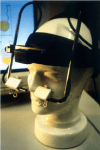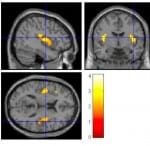I have uploaded a number of eye movement recordings taken from various projects I have been involved with over the years using the Eyelink eye tracking system, to a dedicated U-tube channel! Anyone can browse, ask questions or comment on the videos and I have given links to the relevant publications where available. I’ll be uploading some more soon but take a look here:
http://www.youtube.com/user/HodgsonTim/videos?view=0
The School of Psychology has recently just taken delivery of the next generation of Eyelink system the Eyelink 1000 http://www.sr-research.com/index.html
Most of the videos on the U-tube site were taken with the Eyelink 2. The Eyelink 1000 allows for “heads free” tracking at high spatial and temporal resolution. We plan to use it for testing in neurological patients as well as at the forthcoming Summer Scientist research day http://summerscientist.blogs.lincoln.ac.uk/







